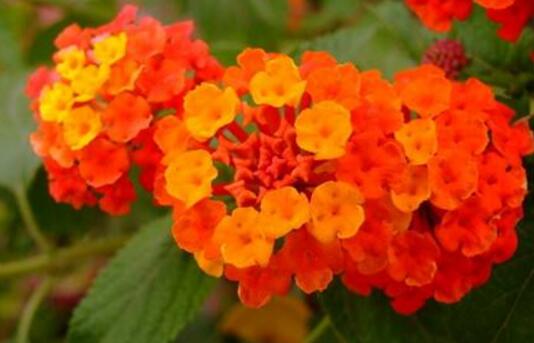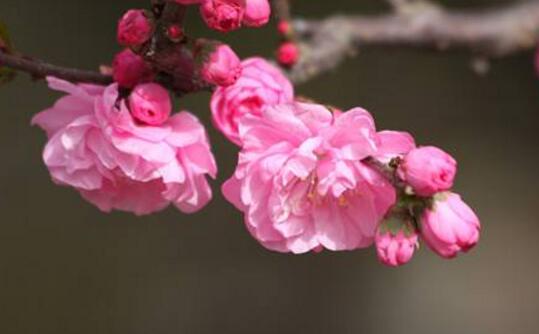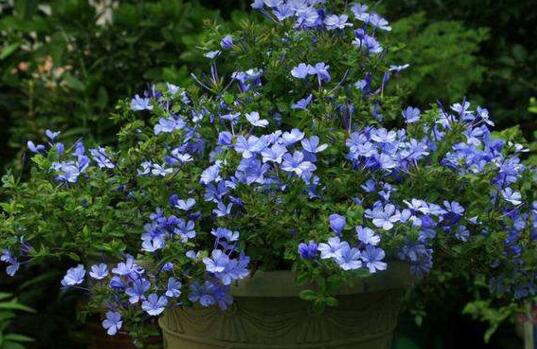How to raise five-color plum, the breeding methods and precautions / light should be sufficient.
Five-colored plum is famous for its changeable color, beautiful shape and thick green leaves, and it has many effects, so it is very popular with flower friends, and the number of people who raise it is also increasing, so how to raise it correctly? Let's take a look at the culture methods and matters needing attention of five-colored plum.
How to raise five-color plum to adapt to the environment

Only by giving a suitable environment according to the characteristics of the plant, can we raise it well, and the five-colored plum is no exception. How to raise the five-colored plum? Let's take a look at its growth characteristics. Five-colored plum is used to warm and humid climate, its requirements for soil is fertile, loose, of course, it is also resistant to barren soil.
Five-colored plum is resistant to drought and has low requirements for moisture, but it can not be short of water for a long time; it likes the environment with plenty of light and slightly tolerates the environment of semi-shade. As an invasive plant, Prunus mume likes the hot climate with high temperature and humidity, and its cold tolerance is weak, so it needs to control the temperature in winter.
2. Culture methods and matters needing attention of five-colored plum
1. Lighting
Five-color plum like light, growing more exuberantly in the full light environment, so people often cultivate it in the open field, if it is a pot plant, it will be preserved in a bright place. Although it has a certain ability to tolerate shade, light will lead to steep growth of plants, slender leaves and less flowering.
Note: five-color plum is very like the sun, and can adapt to the strong light, so there is no need to shade in the summer, so raise five-color plum must let the light enough, do not put it in the dark.
2. Temperature
Five-colored plum has a suitable growth temperature of 15-30 degrees, so it is necessary to ensure that the temperature is not too low in winter, even if it can still blossom at 10 degrees, but in order for it to survive the winter smoothly, the temperature should at least be above 8 degrees.
Note: five-color plum is a tropical plant, it has strong resistance to high temperature, but weak resistance to cold, so in the northern winter, it should be moved to indoor maintenance to avoid frostbite of five-color plum plants when the temperature is below 8 degrees.
3. Soil
In the cultivation methods and matters needing attention of five-color plum, the requirement of soil is the most relaxed, it can grow in acid soil, sandy soil, calcareous soil and clayey soil, so most of the soil can meet the requirements of five-color plum.
Note: although five-color plum does not have high requirements for soil, the best soil is rich, loose, well-drained sandy soil, which can ensure that water and fertilizer can smoothly enter the soil and be absorbed by five-color plum in the process of growth.
4. Watering
Five-color plum is resistant to both drought and moisture, and the requirements for water quality are low. tap water, well water or river water can be watered according to the combination of soil wetting and temperature changes. If the humidity is too low, you need to spray water to the plant to increase humidity.
Note: although five-colored plum has the ability to withstand drought and dampness, it is disadvantageous to its growth if it is not watered for a long time, or too much watering leads to stagnant water, so how to raise five-colored plum on watering should be avoided as far as possible. To see dry pouring, no stagnant water as the principle.
5. Fertilization
The flowering period of five-colored plum is very long, but it does not have strict requirements for fertility, but in order to make its flowers more colorful, it still needs topdressing when necessary, fertilizing 1-2 times a month during the growing period, and phosphate fertilizer is needed before and after flowering to promote more flowering of five-colored plum.
Note: fertilizer should be based on thin fertilizer, both the concentration of fertilizer should not be too high, need to be watered in time after fertilization, so that fertilizer can infiltrate into the soil more quickly.
Diseases and insect pests of Prunus mume
In the breeding methods and matters needing attention of five-color plum, diseases and insect pests need to be controlled in time, and the common pests are leaf blight nematode and common diseases are Botrytis cinerea.
Reproduction of Prunus mume
The reproduction of five-colored plum can be based on cutting, striping and sowing, while family breeding generally uses cutting propagation.
How to raise five-color plum, the culture methods and matters needing attention of five-color plum
People who know the five-color plum blossom must be most impressed by the rich and varied colors of the five-color plum blossom, such as red, pink, yellow, orange, white and so on. The five-colored plum gets its name because of the variety of flowers and colors. It takes some effort to raise the five-colored plum well. Today, the editor will introduce to you how to raise five-color plum, the breeding methods and matters needing attention of five-color plum.
Culture methods and matters needing attention of five-color plum 1. Soil: five-color plum has strong adaptability and is not strict with the soil. Sandy soil, clay heavy soil, acid soil or calcareous soil can grow, and the fertile and loose sandy soil grows best.
2. Watering: five-colored plum likes a humid environment, keep the basin soil moist during the growing period, avoid excessive dryness, and pay attention to spraying water to the leaf surface to increase air humidity.
3, sunshine: five-color plum like the sunny environment, the growing season can be placed in the outdoor sunny place to maintain, even in midsummer also need not shade, but requires good ventilation. If the light is insufficient, the plants will grow too long, the stems and branches will be thin and long, and the flowering will be rare, which will seriously affect the ornamental plants.
4. Fertilization: the flowering period of five-color plum is longer, and topdressing is needed once a month in spring, summer and autumn. Spraying 0.3% urea every 10 days before flowering can make the branches and leaves luxuriant and the flowers colorful.
The above are the breeding methods and matters needing attention of the five-colored plum introduced to you by the editor. I hope it will be helpful to you! The editor believes that as long as you make efforts, you will be able to cultivate better and more beautiful colorful flowers!
How to maintain potted five-color plum? Culture methods and matters needing attention of Prunus mume
The leaves of five-colored plum are large and thick green, the twigs are soft and colorful, which is not only a good bonsai material, but also a good ornamental potted plant, which has high ornamental value. So, how to maintain potted five-color plum? The culture methods and matters needing attention of five-color plum are introduced as follows.
Picture: five-colored plum
I. Culture methods of five-colored plum
1. Soil: five-color plum has strong adaptability and is not strict to the soil. Sandy soil, clay heavy soil, acid soil or calcareous soil can grow, and the fertile and loose sandy soil grows best.
two。 Watering: five-colored plum likes a humid environment, keep the basin soil moist during the growing period, avoid excessive dryness, and pay attention to spraying water to the leaf surface to increase air humidity.
3. Fertilization: pot soil should be loose and fertile sandy loam, the requirements are not strict, the growth period every 10 days to apply mature liquid fertilizer, combined with watering, spraying 3% urea twice every 10 days, can make the leaves thicker and greener. When planting, organic fertilizer is applied as base fertilizer, and initial watering is used to promote growth. when it survives and grows vigorously, irrigation can be reduced, and vine branches can be buried in the soil in open field cultivation, which can be gradually expanded into a large clump.
4. Sunshine: five-color plum like the sunny environment, the growing season can be placed in the outdoor sunny place to maintain, even in midsummer does not need to shade, but requires good ventilation. If the light is insufficient, the plants will grow too long, the stems and branches will be thin and long, and the flowering will be rare, which will seriously affect the ornamental plants.
5. Pruning: the five-color plum grows fast. The branches and leaves that affect the shape should be cut off in time in order to maintain the beauty of the tree. The overlong twigs should be cut short after each flower, and the plants should be re-cut at the end of autumn and before entering the house at the beginning of winter. If the room temperature above 15 ℃ is maintained in the sunny part of the room in winter, the plant can grow and blossom normally, and it should be watered, fertilized and pruned properly. If you can not maintain such a high temperature, control watering, stop fertilization, so that the plant dormancy, more than 8 ℃ can safely survive the winter. Turn the pot once every spring, and trim the plant again, cutting off dead branches, weak branches and other branches that affect the shape of the tree.
Picture: five-colored plum
II. Matters needing attention in the culture of five-colored plum
Five-colored plum can emit a pungent smell, the best place to maintain is the balcony or flower bed, not only drive away mosquitoes and flies, but also beautify the scenery, you can not smell the smell. At the same time, do not touch the plant in the process of maintenance. When you need to trim, you can wear rubber gloves, and the handle of the trimming tool can be lengthened to prevent the juice from dripping on your hands. If you have children and pets at home, especially if the pet is a cat or parrot or monkey, be sure to keep the plant out of reach of these naughty boys.
[conclusion] five-colored plum is native to tropical America and is a tropical plant. It likes the climate of high temperature and humidity and is not resistant to cold, so it needs special attention in the process of conservation. The above introduces the breeding methods and matters needing attention of five-colored plum, hoping to be helpful to you!
- Prev

How to transplant elm leaf plum, with soil / timely watering / combined pruning can improve the survival rate
The growth rate of the elm leaf plum is faster, and sometimes the flowerpot or environmental restrictions lead to the transplanting of the elm leaf plum. In the process of transplanting, care should be taken not to hurt the roots, and the maintenance management after transplanting is also very important. Good maintenance can improve the survival rate of transplant without adversely affecting the growth.
- Next

How to water five-colored plum, the time and water quantity should be scientific / with the watering method of the four seasons
Because five-colored plum is a plant that is tolerant to both drought and moisture, some flower lovers do not pay attention to details when watering, resulting in sometimes watering too much, while not watering for a long time at other times, which is obviously wrong in the culture method of five-colored plum.
Related
- Fuxing push coffee new agricultural production and marketing class: lack of small-scale processing plants
- Jujube rice field leisure farm deep ploughing Yilan for five years to create a space for organic food and play
- Nongyu Farm-A trial of organic papaya for brave women with advanced technology
- Four points for attention in the prevention and control of diseases and insect pests of edible fungi
- How to add nutrient solution to Edible Fungi
- Is there any good way to control edible fungus mites?
- Open Inoculation Technology of Edible Fungi
- Is there any clever way to use fertilizer for edible fungus in winter?
- What agents are used to kill the pathogens of edible fungi in the mushroom shed?
- Rapid drying of Edible Fungi

